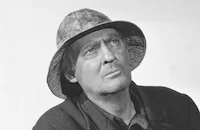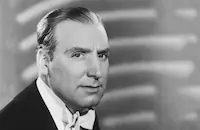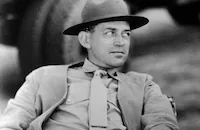Guilty Hands

Brief Synopsis
Cast & Crew
W. S. Van Dyke
Lionel Barrymore
Kay Francis
Madge Evans
William Bakewell
C. Aubrey Smith
Film Details
Technical Specs

Synopsis
Richard Grant, a lawyer who served as District Attorney of New York for ten years, believes that murder is justifiable under certain circumstances. Richard's daughter Barbara, who adores her father, takes him to an island off the Atlantic coast, where they will be the guests of the wealthy playboy Gordon Rich. Upon their arrival, Gordon, an old friend and former client of Richard's, tells the lawyer that he wants to change his will because he is about to be married. When Richard learns that Gordon plans to wed his daughter, he objects to it and reminds the roué that he knows all about the "accident" many years ago in which a former bride of his fell to her death from a high-rise balcony. Because he fears for his daughter's safety, Richard warns Gordon that he will kill him before he sees him marry Barbara. Later, Gordon forces Barbara to reject the affections of Tommy, a young man who is in love with her. Richard's attempt to convince his daughter of Gordon's unsuitability proves useless. At Gordon's dinner party, his engagement to Barbara is announced, and Marjorie West, Gordon's secret lover, shows her displeasure at the news. Later that night, the suspicious Gordon orders two of his servants to follow Richard, and instructs them to report to him if he leaves his room. Gordon then writes a note to the police in which he names Richard as his murderer in the event that he is found dead. Richard manages leave his room undetected and then sneaks into Gordon's study, shoots him, and makes it appear as if the host committed suicide. Marjorie screams when she discovers the body and immediately insists that Gordon was murdered. After Richard tells Barbara that Gordon may have killed himself because he couldn't live with the shame of having wronged so many women, he is shocked when she tells him that she decided not to marry him prior to his death. Richard tries to pin the murder on Marjorie, but she discovers the imprint of Gordon's note to the police on his desk blotter, as well as the props Richard used to make it appear as if he were still in his room during the murder. Once Richard realizes that Marjorie has enough evidence to prove his guilt, he tries to blackmail her to keep silent. No sooner does Richard convince her that he could frame her for the murder if he wanted, than the police, tipped-off by Gordon's boatman, who found his boss's note, arrive and examine the body. Gordon's hand, which has been frozen in a state of rigor mortis since his murder, with his finger on a gun trigger, suddenly moves, and the gun fires, killing Richard. Marjorie, who was about to accuse Richard of murdering Gordon, observes how happy Barbara is with Tommy and decides not to tell anyone the truth about Gordon's murder.

Cast

Lionel Barrymore

Kay Francis

Madge Evans
William Bakewell

C. Aubrey Smith

Polly Moran

Alan Mowbray
Forrester Harvey
Charles Crockett
Henry Barrows
Crew

Videos
Movie Clip



Film Details
Technical Specs

Articles
Guilty Hands
The picture was directed by the famously efficient W.S. Van Dyke - nicknamed "One-Take Woody" - from a script by playwright Bayard Veiller, and although Barrymore himself co-directed, he isn't credited. As a director, Barrymore had received an Academy Award nomination the previous year for the 1929 Madame X, and MGM no doubt wanted to maximize his capabilities. In Guilty Hands, Barrymore plays Richard Grant, a lawyer who, as he lays out to a friend in the first scene, believes there are cases in which murder is justified - and that it's possible to get away with it. Just as he's summoned to a remote island to change the will of a client and old friend, a wealthy, womanizing rapscallion named Gordon Rich (Alan Mowbray), he learns that his beloved daughter, Barbara (Madge Evans) is engaged to Rich. Enraged that Rich would try to manipulate and seduce his innocent daughter, he sneaks into Rich's study that evening and murders him. And that's just the beginning.
In Guilty Hands we know pretty much right off the bat whodunit. The movie's seductiveness lies in the way Grant spins his web of subterfuge, trying to pin the crime on Grant's longtime mistress, the heavy-lidded vixen Marjorie, played by a marvelously sultry Kay Francis (who appeared in the movie on loan from Paramount). The "mystery" plays out Agatha Christie-style, with all the suspects gathered in one room as Grant weighs the possible guilt or innocence of each one.
The story's economy is wondrous, and Barrymore's performance has a sinister sheen to it. Though Grant acts out of protectiveness toward his daughter - he fawns over her, and she over him, to the point that the movie acquires some vaguely incestuous undertones - Barrymore shapes the performance to suggest that there's an undeniable ruthlessness buried deep in Grant. His nasal sneer holds more than a note or two of condescension as he's addressing the potential "murderers." And though Barrymore isn't exactly subtle, his artful contrivance is the point. As even he said of his acting, "I've got a lot of ham in me." At least he was honest about it.
Guilty Hands has a spooky, mysterious aura about it - it builds a mood of dread that's more significant than any specific plot points. And Francis' performance is yet one more jewel in this taut little movie's crown. Mowbray's Rich has a history of using and discarding women - we learn that one young cutie "accidentally" fell to her death from his penthouse window, an unsavory little pre-Code touch - but his obsessive love for Francis' Marjorie is perennial, and you can see why. She gazes at him - at everyone - through dark accusatory eyes, but there are also glimmers of suffering there. She's a vampy beauty with intelligence and soul to burn.
Producer: Hunt Stromberg (uncredited)
Director: W.S. Van Dyke; Lionel Barrymore (uncredited)
Screenplay: Bayard Veiller (screenplay and story)
Cinematography: Merritt B. Gerstad
Art Direction: Cedric Gibbons
Film Editing: Anne Bauchens
Cast: Lionel Barrymore (Richard Grant), Kay Francis (Marjorie West), Madge Evans (Barbara 'Babs' Grant), William Bakewell (Tommy Osgood), C. Aubrey Smith (Reverend Hastings), Polly Moran (Aunt Maggie), Alan Mowbray (Gordon Rich), Forrester Harvey (Spencer Wilson), Charles Crockett (H.G. Smith), Henry Barrows (Harvey Scott).
BW-70m.
by Stephanie Zacharek
SOURCES:
The New York Times
www.kayfrancisfilms.com, Kay Francis' Life and Career
IMDB

Guilty Hands
Quotes
Trivia
Notes
Although the last film for which Lionel Barrymore received a directing credit was Ten Cents a Dance (see below), the Motion Picture Herald review for this film lists Lionel Barrymore as the co-director with W. S. Van Dyke.















